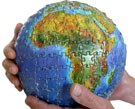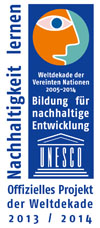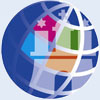Klimaportal der Lokalen Agenda 21 im Raum Harburg
Agenda 2030 /Global Goals
Sustainable development is the key challenge of the 21st century and concerns us all. Combining social, ecological and economic matters for a world in which everyone can lead an informed, healthy and safe life today and tomorrow is a complex task. To achieve this, we need to work together, perceive ourselves as global citizens and embark on a lifelong learning process as no blueprint for success exists.
There are global plans of action for sustainable development, though. The first to come into being was the Agenda 21, declared by roughly 180 nations in 1992 at the first Earth Summit (United Nations Conference on Environment and Development (UNCED). At the UN Millennium Summit in September 2000, 189 participants adopted the Millennium Development Goals (MDGS), specifying eight objectives to be reached by the end of 2015. So far, some progress has been made in terms of fighting hunger and providing basic education worldwide. Yet, the global community is far from being able to provide for the well-being of people and planet.
Thus, before the MDGS expired, a follow-up plan for sustainable development needed to be agreed on. The Rio plus 20 Earth Summit (2012) initiated the drafting of a new global plan for action. Then, in September 2015, 193 heads of state accomplished this task at the United Nations Sustainable Development Summit 2015 (September, 25-27, 2015). Signing a document that had been prepared in an intergovernmental and participative process since 2012, they subscribed to the implementation of the new, universal and highly ambitious agenda entitled "Transforming our world – the 2030 Agenda for Sustainable Development" (in short: Agenda 2030). In contrast to the previous UN resolutions for sustainable development, the post-2015 agenda requires appropriate actions not only from the industrial countries but also from the emerging economies and developing countries.
The Global Goals for Sustainable Development Goals (SDGS)
Placing people, planet, prosperity, peace and partnership at the heart of the post-2015 development agenda, the document stipulates 17 goals and 169 targets to be realized by 2030. Building on the MDGS, top priorities are still the fight against poverty and hunger. According to the UN World Food Programme (WFP), today roughly 800 million people suffer from undernourishment and over one million people are extremely poor as they earn 1.25 US dollars in a day (and thus live below the minimum wage of 2 US dollars a day). Access to medical care and quality education - including education for sustainable development (ESD) as target no. 4.7 - come next. The entire list of global goals reads as follows (see UN-Resolution A/RES/70/1, p 14):
• Goal 1. End poverty in all its forms everywhere
• Goal 2. End hunger, achieve food security and improved nutrition and promote sustainable agriculture
• Goal 3. Ensure healthy lives and promote well-being for all at all ages
• Goal 4. Ensure inclusive and equitable quality education and promote lifelong learning opportunities for all
Target 4.7 By 2030, ensure that all learners acquire the knowledge and skills needed to promote sustainable development, including, among others, through education for sustainable development and sustainable lifestyles, human rights, gender equality, promotion of a culture of peace and non-violence, global citizenship and appreciation of cultural diversity and of culture’s contribution to sustainable development (see UN Resolution A/RES/70/1, p 17)
• Goal 5. Achieve gender equality and empower all women and girls
• Goal 6. Ensure availability and sustainable management of water and sanitation for all
• Goal 7. Ensure access to affordable, reliable, sustainable and modern energy for all
• Goal 8. Promote sustained, inclusive and sustainable economic growth, full and productive employment and decent work for all
• Goal 9. Build resilient infrastructure, promote inclusive and sustainable industrialization and foster innovation
• Goal 10. Reduce inequality within and among countries
• Goal 11. Make cities and human settlements inclusive, safe, resilient and sustainable
• Goal 12. Ensure sustainable consumption and production patterns
• Goal 13. Take urgent action to combat climate change and its impacts*
• Goal 14. Conserve and sustainably use the oceans, seas and marine resources for sustainable development
• Goal 15. Protect, restore and promote sustainable use of terrestrial ecosystems, sustainably manage forests, combat desertification, and halt and reverse land degradation and halt biodiversity loss
• Goal 16. Promote peaceful and inclusive societies for sustainable development, provide access to justice for all and build effective, accountable and inclusive institutions at all levels
• Goal 17. Strengthen the means of implementation and revitalize the global partnership for sustainable development
* Acknowledging that the United Nations Framework Convention on Climate Change is the primary international, intergovernmental forum for negotiating the global response to climate change.
Putting this universal agenda into practice is not at all an easy task. But all is not lost, given mankind improves their sense of responsibility and solidarity (opposed to greed and selfishness), succeed in building collaborative local, national and international partnerships and develop educational policies and schemes as well as political negotiating skills to make everyone part of a future-oriented transformative movement.
Read on
> https://sustainabledevelopment.un.org/?menu=1300 (Sustainable Development Knowledge Platform)
> https://sustainabledevelopment.un.org/post2015/transformingourworld (Agenda 2030 resources)
> https://2030-watch.de/en/monitoring/ (regularly updated data on Germany's progress at implementing the 17 goals according to a set of indicators)
> http://vote.myworld2015.org/ (public involvement in preparing the SDGs: UN global survey for a better world - people could choose six issues that mattered most to them (out of these (17): climate change, healthcare, support the jobless, job opportunities, crime and violence, quality education, gender equality, food and nutrition, transport and roads, clean water and sanitation, good governance, communication access, environmental protection, political freedoms, discrimination and persecution. access to energy plus own suggestions of priority (optional choice).
> Sustainable Development Global Report (UN 2017)
> SDGS Progress Report (UN 2018).
Take action
> http://www.un.org/sustainabledevelopment/takeaction/ (Lazy people's guide to saving the world)
Teaching resources
The Planet and the 17 Goals, by Margret de Heer (and other CHAKRA comics on various SDGs):
> http://www.comicsunitingnations.org/comics/ (Comics Uniting Nations)
The world's largest lesson (lesson plans for school teachers): > http://worldslargestlesson.globalgoals.org/.
And watch this:
> How can we make this world a better place by 2030 (15-minute lTED talk by Micheal Green, 2015)
answer in brief: Yes we could possibly do the trick, but not with business as usual Let*s demand a different path....
Chris Baudy







